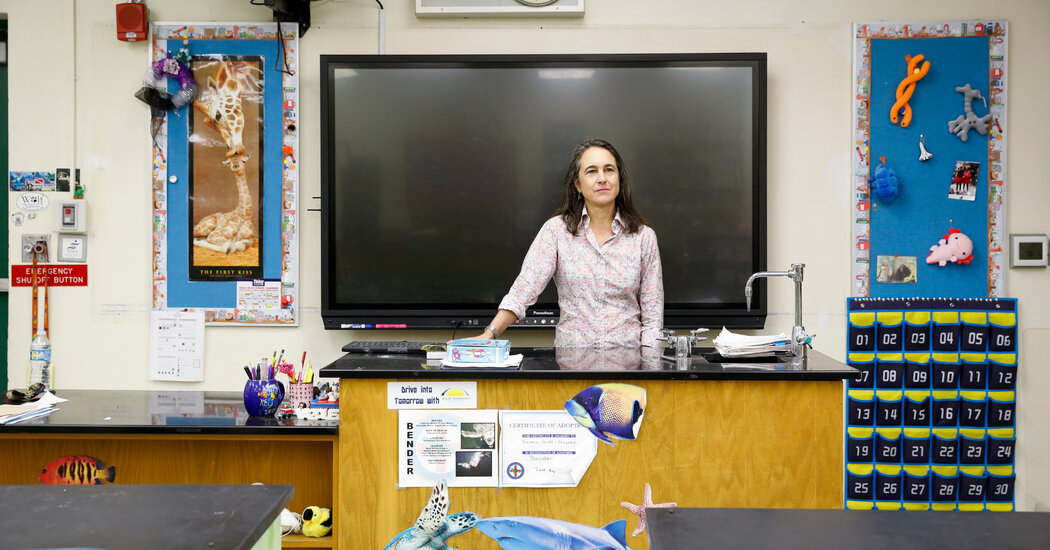
This weekend, listen to a collection of articles from around The New York Times, read aloud by the reporters who wrote them.
Written and narrated by Winston Choi-Schagrin
In Florida, where Bertha Vazquez, a seventh-grade teacher, has taught for more than 30 years, and where her students are already seeing the drastic impacts of a warming planet, the words “climate change” do not appear in the state’s middle or elementary school education standards.
Climate change is set to transform where students can live and what jobs they’ll do as adults. And yet, despite being one of the most important issues for young people, it appears only minimally in many state middle school science standards nationwide. Florida does not include the topic, and Texas dedicates three bullet points to climate change in its 27 pages of standards. More than 40 states have adopted standards that include just one explicit reference to climate change.
Ms. Vazquez makes the state’s requirement that she teach energy transfer an opportunity to talk about how wind turbines work. The ecology requirement becomes a chance to discuss the consequences of deforestation.
Her commitment to the subject is not representative of how climate change is taught around the country.
In Bob Dylan’s new book, “The Philosophy of Modern Song,” the artist has rounded up 66 songs, from Bobby Darin’s “Mack the Knife” and Webb Pierce’s “There Stands the Glass” to Nina Simone’s “Don’t Let Me Be Misunderstood” and the Clash’s “London Calling,” and he riffs on them.
These riffs sound a lot like his own song lyrics, so much so that the Times book critic Dwight Garner kind of wanted it to be a new record instead, “to hear these lines come croaking up from Dylan’s 81-year-old lungs and past his buckshot, barb-wired uvula.”
Dylan slits open the underbelly of American life; he pokes at the entrails; he draws a lot out of these songs. It’s total warfare against the humdrum, and it’s completely great, except, Garner said, when it isn’t.
◆ ◆ ◆
Written and narrated by Julia Moskin
At the end of the year that Julie Powell spent cooking every recipe (more or less) from Julia Child’s “Mastering the Art of French Cooking,” she came to mayonnaise collée. It is a hand-whisked mayonnaise thickened with gelatin — a kind of stiff, salty garnish that was piped decoratively over aspics and the like in Mrs. Child’s time. “1961 was a different country, no doubt about it,” Ms. Powell wrote in 2003, casting a retrospective eye on a project she thought was over.
When Ms. Powell’s death, from cardiac arrest on Oct. 26, was reported, it unleashed a surprising avalanche of public affection, complicated opinions and nostalgia for the early 2000s.
She didn’t start blogging because she was a prescient media observer; she wasn’t trying to capitalize on the audience for digital food content that had been building since 1995. And she didn’t know that she was part of a wave of women whose unfiltered takes on domestic life would inform influential sites like Mothers Who Think and The New York Times’s Modern Love.
What Ms. Powell did possess was an understanding that starting out as a cook is a universal experience, and a voice that made every recipe sound like an adventure.
◆ ◆ ◆
Written by Neil MacFarquhar and Alina Lobzina | Narrated by Neil MacFarquhar
Hundreds of Russians are engaged in a grass-roots effort to find missing sons, husbands, brothers and other loved ones who fought for Russia in the Ukraine war, a role that relatives and human rights advocates say was thrust upon them because the Ministry of Defense was woefully unprepared for the task.
The scale is staggering. The Pentagon in late summer estimated that 70,000 to 80,000 Russian soldiers have been killed and wounded, with many others missing.
But their fate has remained a mystery for many of their loved ones back home, who say the system for finding missing soldiers is as disorganized as Russia’s military effort, which has been marked by dysfunction from the beginning.
◆ ◆ ◆
Written by Claire Cain Miller and Francesca Paris | Narrated by Claire Cain Miller
Debates over what children are reading and learning in school, and who gets to decide, have divided school board elections and other state and local races nationwide. But most Americans, and especially parents of school-aged children, are satisfied with their local schools, a new survey by Morning Consult for The New York Times found. Yet there is one issue that generated more opposition than any other: teaching about gender diversity, and about the rights of gay, lesbian, bisexual and transgender people.
This topic — more than teaching about critical race theory or social-emotional learning — was the most divisive, according to the survey of 4,421 people in October. Four in 10 respondents opposed such instruction, and the same share supported it (the rest weren’t sure).
One group of people was more likely to oppose teaching about sensitive social issues and to want more parental control in schools: people who said schools were closed too long during the pandemic, particularly conservatives.
The Times’s narrated articles are made by Tally Abecassis, Parin Behrooz, Anna Diamond, Sarah Diamond, Jack D’Isidoro, Aaron Esposito, Dan Farrell, Elena Hecht, Adrienne Hurst, Emma Kehlbeck, Tanya Pérez, Krish Seenivasan, Kate Winslett, John Woo and Tiana Young. Special thanks to Sam Dolnick, Ryan Wegner, Julia Simon and Desiree Ibekwe.







